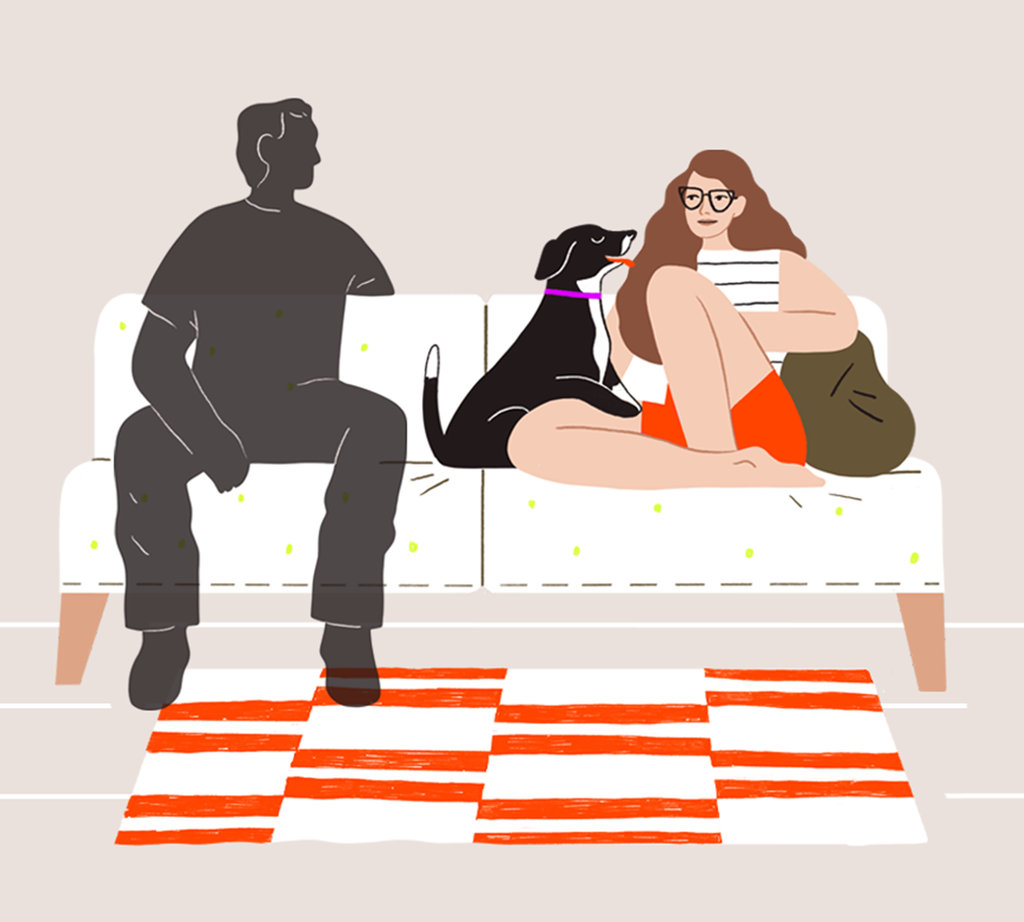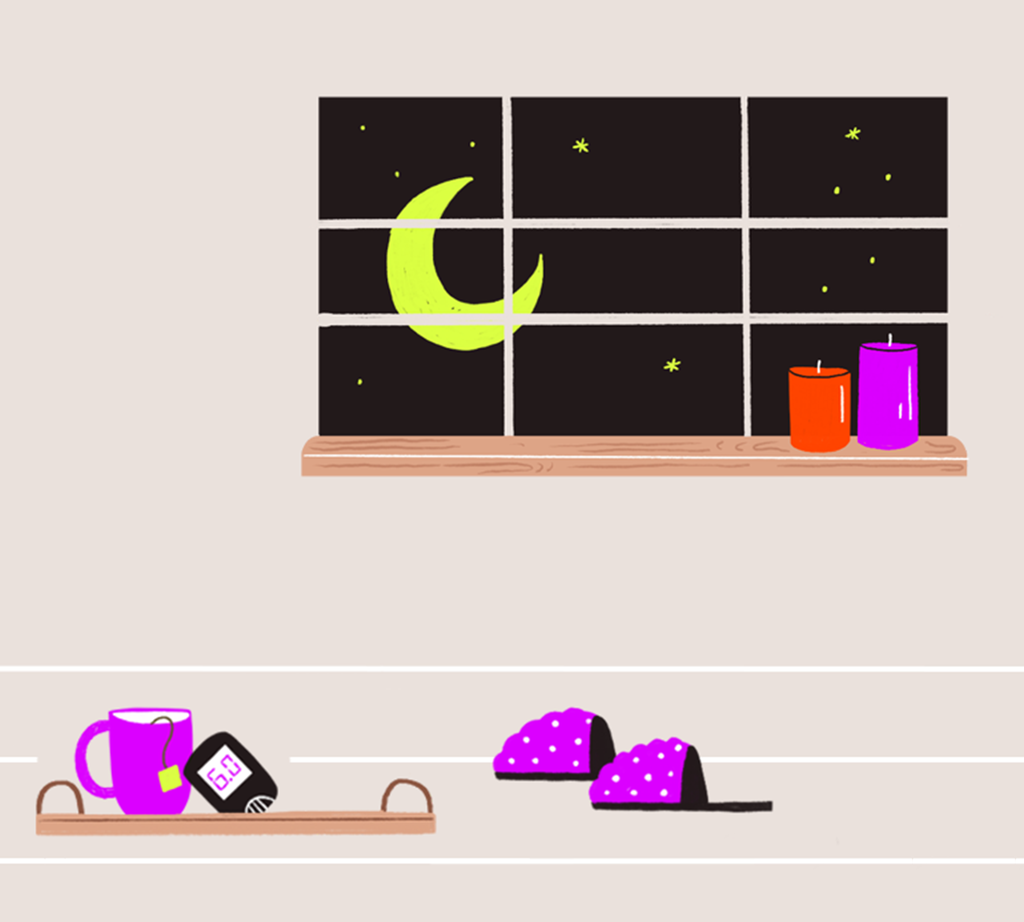Last fall, a conversation about Emily in Paris accidentally saved my life.
I’d been on a late-night FaceTime call with one of my long-distance best friends (she lives in Arizona; I’m in Brooklyn). We were arguing about whether the aforementioned Netflix show was so-bad-it’s-good or just really, really bad… and then, nothing.
I regained consciousness about an hour later, slumped over on my sofa with my dog Marty whimpering in the bathroom and a paramedic squeezing high-glucose gel into my mouth, while another totally different friend, who lives just a few blocks away from me, stood anxiously in the doorway.
After my blood sugar recalibrated and the paramedics left, I asked my still-hovering friend to tell me what had happened. She explained that I had fainted during my FaceTime with Arizona Friend, who immediately called and texted all of our mutuals, including Brooklyn Friend and my sister in Connecticut. It was my sister who notified our parents; they called an ambulance. And it was Brooklyn Friend who rushed down the street to my apartment. The paramedics and BF arrived at the same time; BF took care of Marty, my anxious rescue dog, while the EMTs brought me back from an especially bad bout of diabetic hypoglycaemia.
That experience left me with two overwhelming internal reactions. First, I felt beyond grateful for my amazing friends and family and the speed and efficiency of 21st-century communication. And second, I felt a deep, gnawing sense of fear. What if this hadn’t happened while I was on FaceTime? What if I’d been hanging out and watching TV, with only Marty for company?
By choosing to live alone as a single woman with Type 1 diabetes, am I putting my safety at constant risk?

To be honest, I don’t often dwell on my singledom. I’ve been unattached for most of my adult life, and while I wouldn’t exactly call it a deliberate decision — I’d be open to finding a partner, if the circumstances were right — it’s also not something that I’ve put much effort into changing, even before the pandemic made in-person dating nearly impossible. I cherish my independence, and I love the fact that, aside from Marty, I don’t need to base my decisions around anyone or anything else — unless, of course, you count my diabetes as “anything else.”
I got my diagnosis at 16 years old, in the spring of my junior year of high school. Between prepping for the SATs and AP exams, taking my driving test, and starting the college application process, I quickly came to view my illness (an incurable autoimmune disease that will be with me for the rest of my life) as nothing but an inconvenience, as something that I “didn’t have time” to deal with. I got on an insulin regimen and I learned how to manage my blood sugar numbers. But during those early years, I somehow convinced myself that ignoring “the problem” as much as possible would, against all logic and reason, make it go away. That meant that I refused to discuss it with friends, got rid of my (fairly large and conspicuous) insulin pump in favour of injections, and hid any serious blood sugar spikes and drops from my parents and my doctors.
Seventeen years, countless mistakes, and multiple hospitalisations later, I finally understand how naive I’d been. And now that I’m in my 30s and find myself wondering what my next several decades on this earth might look like, I can admit that I’m afraid a time will come when I give myself a wrong dosage and end up unconscious, helpless, and dangerously alone.
Of course, I’ve taken precautions since my FaceTime mishap: I decided to start using an insulin pump again (they’ve become a LOT smaller than they were in 2004) and I also got a continuous glucose monitor that tracks my blood sugar throughout the day and notifies me if I’m trending too low or too high. But I also know that managing a chronic illness isn’t a precise endeavour. Even if I do everything perfectly from here on out (unlikely), even if I never have another hypoglycaemic or hyperglycaemic episode in my life (impossible), things can and will go wrong. And without a live-in partner, I worry that one day I’ll need assistance and won’t be able to get it before it’s too late.
Ultimately, though, I’m not interested in seeking out a partner solely because I’m frightened about my future health. If and when I do decide to begin a relationship with someone, I want to do it because I want to, not because I’m afraid of what will happen if I don’t.

My determination to figure out other ways to keep myself safe has led to some interesting YouTube searches, including “how to teach your dog to open your refrigerator” and “can dogs call ambulances?” I’d be lying if I said that I haven’t looked into getting a Life Alert. (If you’re wondering: It’s possible to get a medical alert system as a 30-something, but it’s a hassle.)
If I’m making it sound as though I’ve resigned myself to a life completely free of romantic partners, that’s not the case. But I’ve often questioned whether my fixation on independence might get in the way of discovering if a partnership will make me happy. As I move farther into my fourth decade of life and learn to treat my illness with the gravity it deserves, however, I’m more and more convinced that seeking out ways to keep myself healthy and safe without expecting others to pick up the slack is absolutely necessary. I don’t need a caretaker, and I don’t want to see any prospective partner as one — nor do I want them to view my diabetes as an overwhelming obligation, but instead as a challenging but manageable situation, just one part of who I am, not the entirety of my reality.
I have yet to find that partner, though. So, my fear of dying alone — in a literal and fairly immediate sense — remains. From where I’m standing now, it feels important to acknowledge that fear, and to allow it a little bit of space. Denial didn’t serve me well where my diabetes was concerned, and I don’t see it as a useful strategy here, either. But while the fear may continue buzzing around my brain like a gnat that just can’t find the open window, I won’t let it define my life, my singledom, or my future prospects for partnership.
I learned early on to describe my diabetes as something that I have, not something that I am. Saying “I have diabetes” feels genuine to me, while saying “I am a diabetic” never did. On a similar note, the statement, “I am afraid to live alone” strikes me as all wrong. But “I have fears about living alone”? I can work with that.
Each installment of Refinery29’s Single Files column will feature a personal essay that explores the unique joys and challenges of being single right now. Have your own idea you’d like to submit? Email single.files@vice.com.
Like what you see? How about some more R29 goodness, right here?
I’m Fat, & That Makes Using Dating Apps Difficult